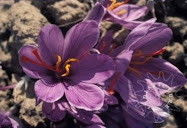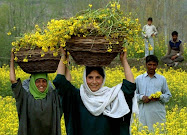Hayrath, the most fabulously celebrated festival of Pandits in Kashmir has been so since pre-historic days probably because of the age old tradition of worshipping Lord Shiva in various forms along with consort, Maa Durga, the essential accompaniment of the Lord as per Kashmir Shaivism. The traditions attached with the festival are very elaborate and thought provoking. The celebrations used to be much more detailed and extensive during olden days but have now been limited to very brief festivity and Puja. The Watak-Puja actually started on the very first day of the dark fortnight of Phalgun and continued till the eighth day of bright fortnight of Phalgun (Taila Ashtami). It’ll not be out of place to mention here that KPs follow the lunar Calendar instead of the solar one and all festivals and occasions are calculated according to consecutive days of dark and bright fortnights called Tithi and surprisingly the Kashmiri Calendar has always proved the most dependable and exact in its calculation without any flaw whatsoever for the last thousands of years of calculation.
Being the number one festival of KPs lots of social attributes have been gradually connected to it. All the members of the family are to be invariably present and participate in the Puja and seek blessings. All married women visit their parents house to have a formal washing before the festival preferably on tenth day of the dark fortnight of Phalgun called Dyar-e-Dahem as she along with her husband and children are given cash gifts and new clothes. As already stated in an earlier post the children get special cash gifts from their elders called Heyrath Kharech on Salam the following day of the festival. Hayrath is fairly significant for the newly weds in the family as they are given special gifts from the parents of both husband and wife on the occasion and the new arrivals in the house are especially greeted in the puja and honoured along with their parents.
Walnuts called Doon in Kashmiri are fairly important in the Puja as well as the object for Prasaad. The walnuts kept soaked in water in the Puja for three days are considered as the most auspicious Prasaad and are taken at home and distributed among friends and relatives after the festival. This exchange of walnuts adds to its sanctity as there is enough activity in the following week in the form of visiting neighbours, friends and relatives. The Prasaad has an important share for the married sisters and daughters of the house who get it along with some cash and the Teeka from the Puja essentially with all sanctity and devotion…… (to be continued)
Subscribe to:
Post Comments (Atom)
.jpg)




What a spectacle it must be such pious devotion accompanied with so much togetherness and love for each other.Indeed Lord Shiva binds us in a holy sutra.Do post the pics of this puja on the blog.
ReplyDelete